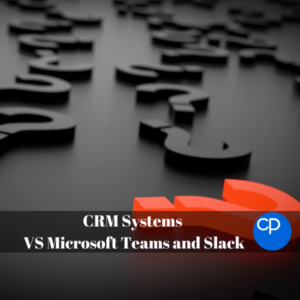 With businesses, in general, looking to review and re-tool as economies begin to wind up again, I think it is important that businesses make the correct decisions and avoid cutting corners, especially when it comes to vital systems like CRM. Recently I came across an article on Forbes that asked a serious question, the article was titled: On CRM: Can Microsoft Teams or Slack replace a CRM?
With businesses, in general, looking to review and re-tool as economies begin to wind up again, I think it is important that businesses make the correct decisions and avoid cutting corners, especially when it comes to vital systems like CRM. Recently I came across an article on Forbes that asked a serious question, the article was titled: On CRM: Can Microsoft Teams or Slack replace a CRM?
There is value in discussing the similarities and differences between these two types of systems and in this article, I will look at outlining these aspects in the hope that readers will feel empowered in making the right decision for themselves and the businesses they represent.
Understanding Microsoft Teams & Slack
Essentially these 2 systems are unified communication and collaboration platforms. They are a chat-based tool that seeks to replace email as the method of communication within the boundaries of a business. They can be used for document storage and offer functionality such as shared calendars, improving the way employees across the different levels of a business are able to collaborate and communicate.
Understanding CRM systems
CRM systems are everything that a business does to acquire, develop and retain customers and the subsequent relationships that follow as a result of supplying products and/or services. CRM systems are vital to any business, whether you are big or small, CRM systems go a long way to ensure that workflows are seamless.
The article mentioned in my introduction quite rightly points out that there are important functions that CRM systems have, that Microsoft Teams and Slack do not. These functions include:
- Workflow Automation: refers to the design, execution and automation of processes based on workflow rules where human tasks, data or files are directed between people or systems based on pre-defined business rules.
- Marketing Campaigns: these are campaigns that are put together by the marketing team with the aim of increasing awareness, driving new business and website traffic, the generation of leads and the building of brand awareness.
- Service Ticket Generation: also referred to as customer service case management, is a tool that processes and catalogues customer service requests against the relevant client. This tool greatly improves customer service and allows for multiple employees at different levels to work on and comprehend exactly where the business is on dealing with each service case.
- Forecasting: is the process using present and historical data as inputs to make educated estimates that are predictive in determining the direction of future trends. Forecasting is used to determine budget allocation, business expenses or potential revenue for an upcoming period of time.
- Opportunity Management: opportunities, also known as leads or sales prospects, form part of every business. Opportunity management refers to a methodical process where incoming leads are qualified, examined and cultivated into new business opportunities.
Can you replace CRM systems with Microsoft Teams or Slack?
If Microsoft Teams was indeed a replacement to CRM systems then Microsoft themselves would not offer products like Microsoft Dynamics CRM. I feel that although the systems are similar at the same time, they are completely different and the adoption of both will only strengthen a business. I represent Collier Pickard; we are independent CRM consultants and our experience in understanding the similarities and differences is why we are so successful.
The article says that CRM systems can be replaced and that it depends on an organization’s needs and culture. I disagree, I cannot speak for need, if a business feels that it does not need CRM then that is their prerogative but I can certainly speak for culture. My experience and that of the team of consultants I represent means that we understand how to define the culture needed to ensure that time to value is reduced when adopting a CRM system and the benefits are felt almost immediately.




